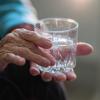In the summer months, temperatures can be very high. Many people enjoy this hot weather. There is plenty of sunshine and that puts people in a better mood. It also makes them want to go outside more. When we spend time in the sun, our bodies produce vitamin D. We also take more physical exercise, which can help prevent chronic disease.
But people can also get health problems as a result of the heat. For this reason, it is important to pay extra attention to those who are unable to take good care of themselves. This includes the elderly, people with chronic conditions and young children. For these groups, heat can lead to health problems more quickly. The National Heatwave Plan helps prevent this as much as possible.
National Heatwave Plan
The National Heatwave Plan is a warning system. RIVM uses the plan to inform organisations, healthcare professionals and informal carers about the expected heat. They can then take the heat into account when giving care and support to vulnerable groups. This will make it possible for them to help reduce discomfort and health problems and avoid both if at all possible.









